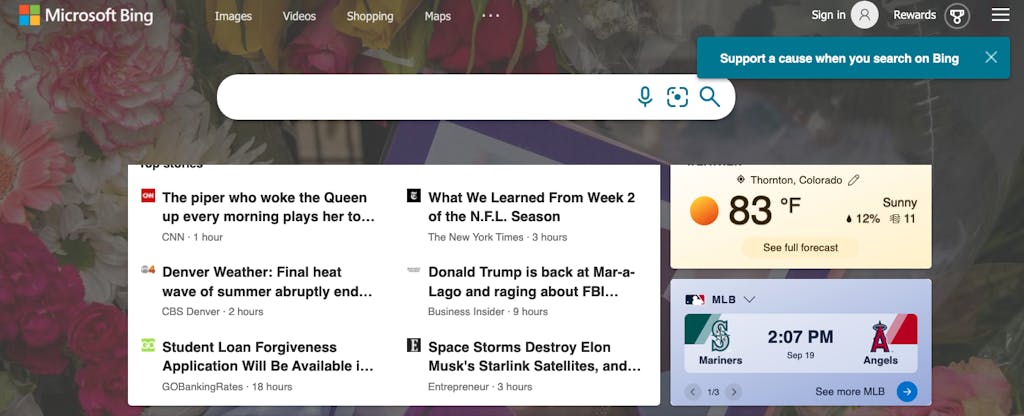
In most of our SEO guides, you hear us talk about how to optimize for Google, the biggest search engine out there with around 83% of the search engine market share (Statista). But there’s another search engine that’s worth exploring and optimizing your site for.
Bing Search was introduced by Microsoft in 2009, and it’s the default search engine for Microsoft products and the browser Microsoft Edge. It typically gets between 900 million to 1 billion monthly users (Statista), an audience you don’t want to miss out on. This guide will introduce you to the features of Bing, lay out some differences between Bing and Google, and give you a better understanding of what this search engine has to offer.
Differences Between Google and Bing
Opening the search engines side-by-side, you might notice some aesthetic differences, but what matters most to business owners and webmasters are the differences in what it takes to rank in each search engine’s algorithm.
Google Ranking Factors
- Fresh content: While domain age is important to Google, it also rewards fresh content. With so many new posts and pages published every day, Google likes to stay on top of trends and serve up content that is new and relevant, so this type of content is often rewarded with good rankings. Bing, on the other hand, prioritizes established content that has been around for a while and garnered a good reputation.
- Sites optimized for mobile: More and more searches are happening on mobile, and Google has stayed on top of this trend with its mobile-first indexing, which gives precedence to websites that have been optimized for mobile.
- Quality content: Using language processing technology, Google’s algorithm has gotten better and better at understanding content and serving up relevant results even if they don’t match the exact keywords. Google uses language processing to understand the meaning behind a query as well as to understand the content of a page and whether it satisfies that query. Google does this for all pages, meaning any of the pages on your website (not just your homepage) have a chance of ranking as long as they’re optimized.
- Quality backlinks: One of the major ways in which Google determines whether your site is worth ranking is by looking at other pages that link to your website. The more quality, trustworthy sites are linking to yours, the better your chances are of ranking well on Google.
Bing Ranking Factors
- Exact match keywords: Google’s rankings are based on a mix of exact keywords and relevant content, but Bing mostly focuses on exact-match keywords. This means that to rank well on Bing, it’s important to use the exact keywords you found in your keyword research. Of course, you want to rank well on both search engines, so it’s equally important to have quality, relevant content on your pages to improve your Google rankings.
- Optimized homepage: While Google ranks pages individually, traditional site structure is important to Bing’s algorithm. Bing prioritizes websites with strong homepages in their rankings, so it’s crucial to make sure that your homepage is optimized for keywords and on-site SEO as well as technical SEO elements. Bing is not only looking at the text on your site but also your multimedia elements, so it’s important that images, video, and audio are high quality to improve your rankings.
- Meta descriptions: Meta descriptions are a direct ranking factor on Bing, while on Google they’re not weighed quite as heavily (although they do influence click-through rates). For better Bing rankings, it’s important that meta descriptions have exact keywords and offer a clear summary of what your company has to offer (this helps improve how your site is displayed in the Google SERP as well, so it’s a win-win!)
- Social media presence: Both search engines value social proof, but while Google focuses on reviews, Bing also integrates social media into their SERP. They display whether your friends on social media have reviewed or recommended companies in the SERP, which can have an impact on who you choose to book with. This makes your company’s social media profiles and important factor. If you want some tips on improving your social media, head over to our guides on the subject!
Bing Features
If you want to start optimizing for Bing or advertising on their platform, here are some of the features (for both webmasters and users) you should be familiar with.
For Webmasters
- Webmaster Tools: Much like Google Analytics, Bing’s Webmaster Tools allows you to track your website’s performance and traffic. It includes reporting tools to help you understand how people are discovering your site and how you can increase traffic as well as diagnostic tools that offer information on what people are searching for and how to optimize for search. The Site Scan tool is particularly useful for identifying common technical SEO issues.
- Bing Places: This feature is similar to Google My Business, allowing you to create a listing for your business and ensure that users can easily find your address, contact information, directions, website, and more. Like GMB, Bing Places displays user reviews, allows you to upload photos of your business, and displays your business on Bing Maps for local searches.
- Microsoft Advertising: This is Microsoft’s PPC advertising platform, similar to Google Ads. According to their website, advertising on the Microsoft Search Network gives you access to 49.4 million desktop searchers who are not on Google. They also make it easy to integrate your existing Google Ads into Microsoft Advertising.
For Users

- Bing Rewards: Bing sweetens the deal for users who choose their search engine by offering credits that can be traded in for gift cards, subscription services, sweepstakes, and even donations.
- Smart Tags: This feature of Bing News helps users contextualize news articles by linking key topics together, creating a bigger picture of the issues that are currently trending in the news.
- Bing Maps: In a great example of listening to user feedback, Bing has redesigned its Maps feature and added improved functionality. It’s now becoming a solid competitor to Google Maps.
- Video Search: Bing puts a lot of emphasis on its video search feature, which is certainly important considering the prominence of video in marketing today. Large thumbnails, video details right in the SERP, and handy related search suggestions come together to create a great video search experience.
- Homescreen: If you’re a Google user and are accustomed to their sparse homepage, you might be surprised by the different approach Bing takes. Their homepage displays beautiful photography in the background with images that change regularly, and at the bottom of the page, they feature trending news stories.
Now that you’re all caught up on what Bing has to offer, you can make sure your site is optimized for one more search engine, allowing you to reach even more searchers. For more search engine tips, head over to our SEO guides!

